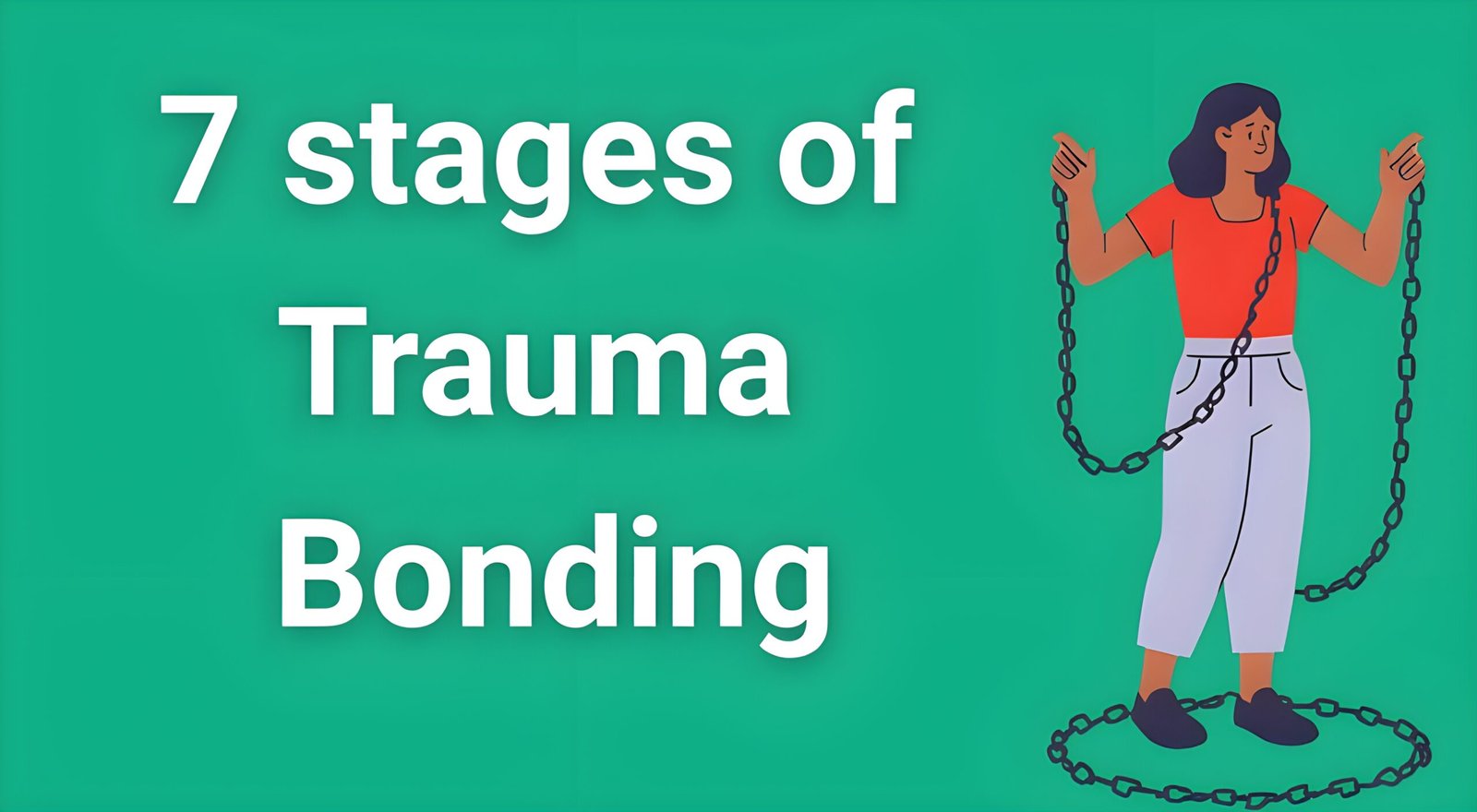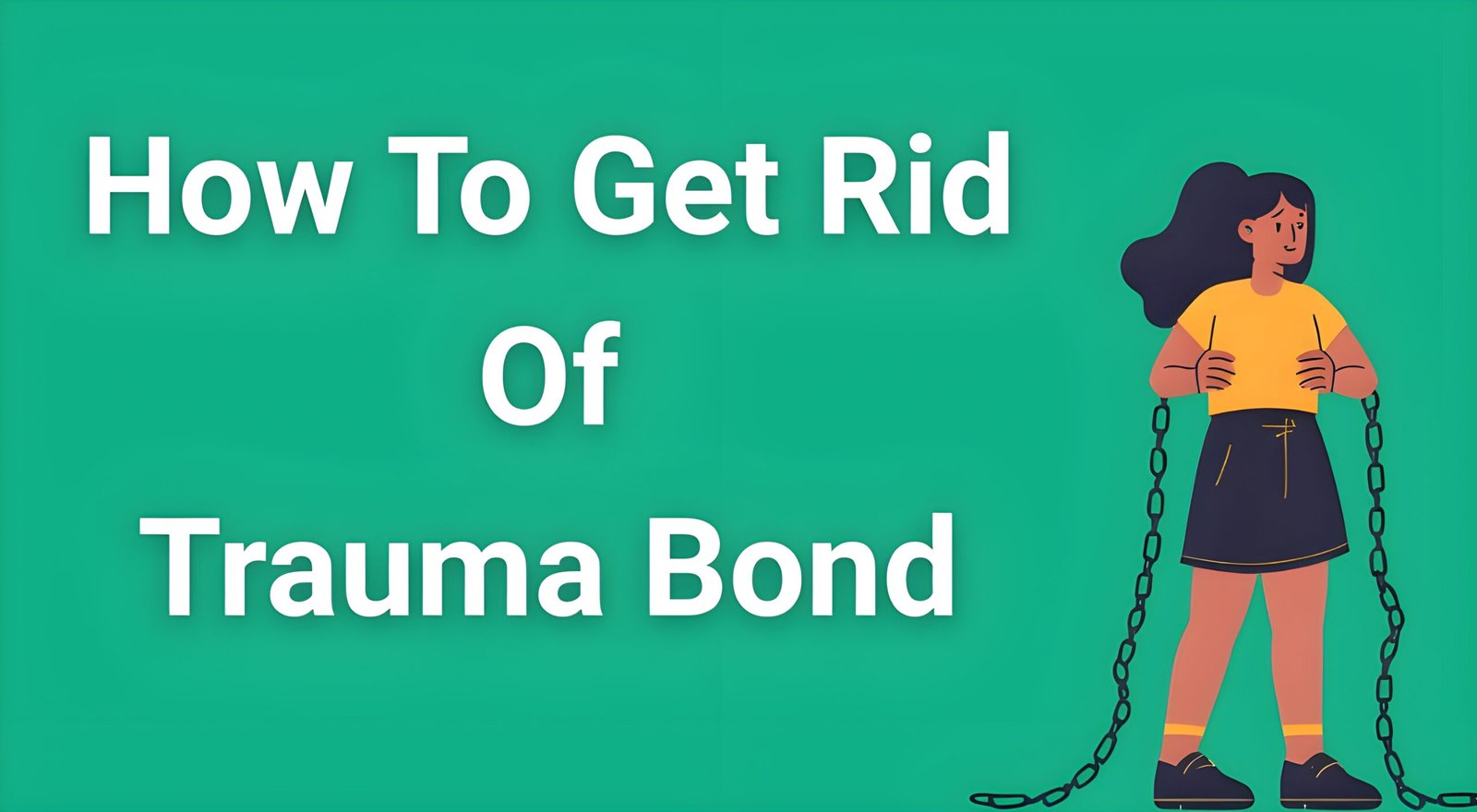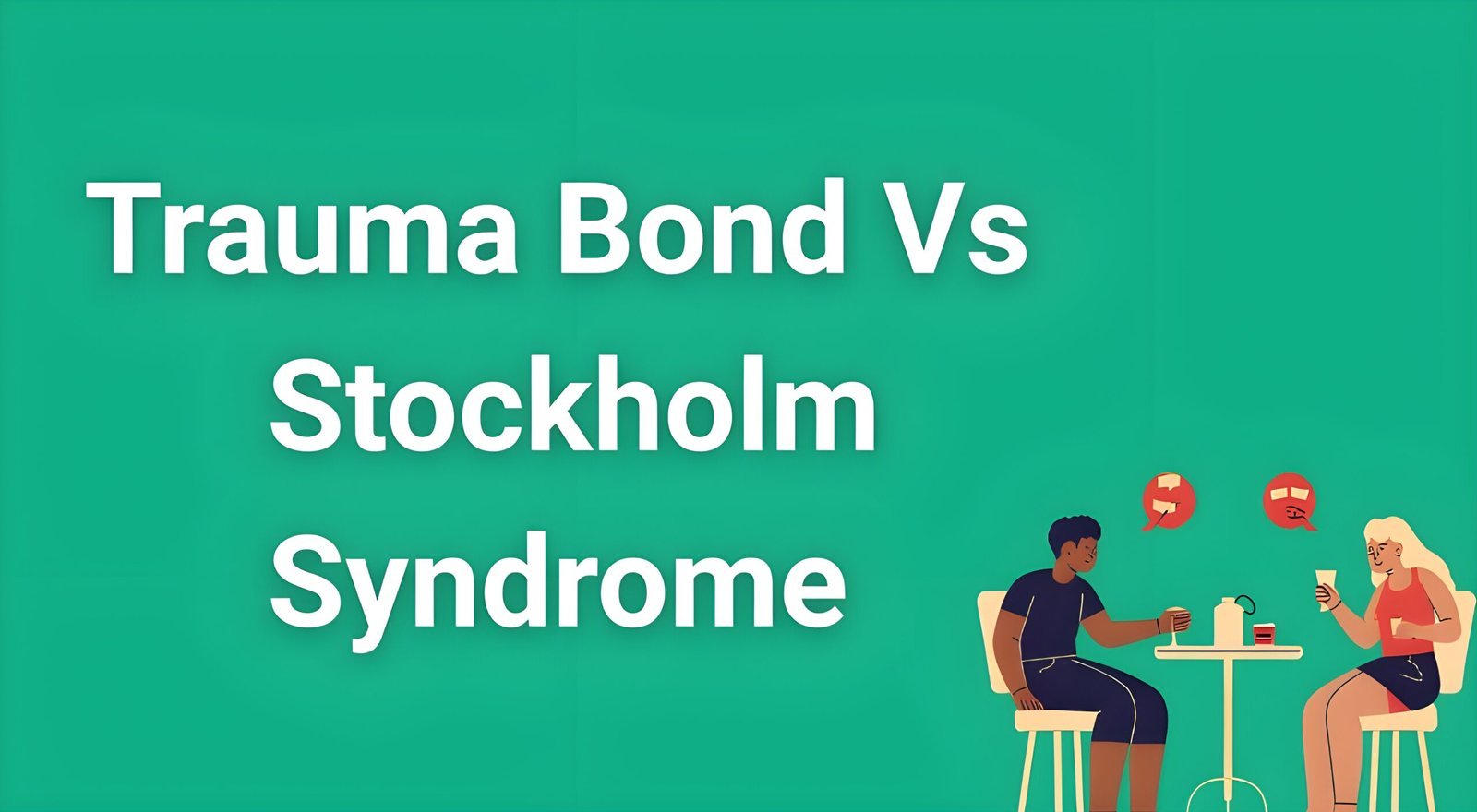That sinking feeling in your stomach when you realize you’re checking their social media again. The crushing weight of knowing something’s wrong, yet feeling powerless to walk away. If you’ve found yourself asking “Why can’t I just leave?” despite recognizing toxic patterns, you’re likely experiencing the 7 stages of trauma bonding – a psychological phenomenon that creates powerful emotional chains stronger than logic or willpower.
- What Is Trauma Bonding and Why Does It Feel Like Addiction?
- The 7 Stages of Trauma Bonding: A Detailed Breakdown
- Why Breaking Trauma Bonds Feels Impossible
- Recognizing the Signs: Are You Trauma Bonded?
- Breaking Free: Your Path to Recovery Begins Now
- Frequently Asked Questions About Trauma Bonding
- Your Freedom Journey Starts With Understanding
Understanding these stages isn’t about blame or judgment. It’s about recognizing that your struggle to leave isn’t a character flaw – it’s a documented psychological response that affects millions of people trapped in toxic relationships. Whether you’re dealing with a narcissistic partner, manipulative parent, or emotionally abusive friend, these stages follow predictable patterns that, once understood, can become your roadmap to freedom.
What Is Trauma Bonding and Why Does It Feel Like Addiction?
Trauma bonding creates an intense emotional attachment between an abuse victim and their abuser through cycles of punishment and reward. Think of it as your brain’s misguided attempt to survive in a dangerous situation by forming a connection with the source of both pain and intermittent relief.
Dr. Patrick Carnes, who first coined the term, describes trauma bonding as a survival mechanism that develops when someone experiences intense emotional or physical states with another person. Your nervous system becomes conditioned to associate this person with both safety and danger, creating a powerful psychological dependency that feels remarkably similar to drug addiction.
The comparison to addiction isn’t metaphorical – it’s neurological. When your abuser shows kindness after cruelty, your brain releases dopamine and oxytocin, the same chemicals involved in substance dependencies. This creates literal withdrawal symptoms when you try to distance yourself, explaining why leaving feels physically and emotionally devastating.
Understanding this process helps explain why intelligent, strong people find themselves unable to walk away from relationships they know are harmful. Your brain has been chemically rewired to crave the very person causing you pain.
The 7 Stages of Trauma Bonding: A Detailed Breakdown
Stage 1: Love Bombing – The Irresistible Hook
Love bombing appears as overwhelming affection, but it’s actually a calculated manipulation tactic designed to create rapid emotional dependency. During this initial stage, your abuser showers you with excessive attention, gifts, compliments, and promises of an extraordinary future together.
This isn’t normal courtship or genuine enthusiasm. Love bombing is characterized by its intensity and speed – declarations of love within days, discussions of marriage or moving in together after weeks, and constant contact that feels both exhilarating and overwhelming.
The psychological purpose is clear: create such an intense emotional high that you become addicted to their validation. They’re studying your deepest desires, insecurities, and dreams, then reflecting them back to you in ways that make you feel uniquely understood and cherished.
Common love bombing behaviors include excessive texting throughout the day, expensive gifts early in the relationship, grandiose gestures that seem “too good to be true,” immediate discussions of soul mates or destiny, and overwhelming compliments that feel disproportionate to how well they actually know you.
This stage sets the foundation for everything that follows. It creates the “golden period” your mind will desperately try to return to throughout the trauma bonding cycle, making you believe that if you could just be good enough, loving enough, or patient enough, you could recreate these magical early days.
Stage 2: Trust and Dependency – Building the Emotional Prison
As love bombing creates intense feelings, the second stage focuses on making you emotionally and practically dependent on your abuser. They systematically work to position themselves as your primary source of validation, support, and decision-making guidance.
This dependency building happens through seemingly caring behaviors. They might offer to help with your problems, gradually taking over responsibilities you once handled independently. They insert themselves into your decision-making process, initially offering helpful advice that slowly becomes expectation of consultation on all choices.
Simultaneously, they begin subtle campaigns to weaken your other relationships. Comments about your friends being “jealous” of your relationship, suggestions that your family “doesn’t understand” you like they do, or creating conflicts that make social gatherings uncomfortable gradually isolate you from your support network.
The trust component operates through testing and reward systems. They might create situations to test your loyalty, then reward compliance with affection and punish independent thinking with withdrawal of love. This conditions you to seek their approval and fear their disapproval above all else.
Financial dependency often develops during this stage too. They might encourage you to quit a job, move in together to “save money,” or take control of financial decisions “to help you.” Each step makes leaving practically more difficult while reinforcing their role as your caretaker and decision-maker.
By the end of this stage, you’ve unconsciously restructured your life around their needs, opinions, and presence. The trap is set, and you don’t even realize you’re in it.
Stage 3: Criticism – Tearing Down What They Built Up
The shift into criticism can feel sudden and devastating. The person who once praised everything about you now finds fault with the very qualities they previously adored. This isn’t ordinary relationship conflict – it’s systematic devaluation designed to destroy your self-confidence and increase your dependency.
Criticism in trauma bonding serves multiple psychological purposes. It creates cognitive dissonance – the mental discomfort of holding contradictory beliefs about the same person. Your mind struggles to reconcile the loving person from stage one with this critical, harsh individual, often resolving this discomfort by blaming yourself.
The criticism typically targets your core insecurities, which they learned during the love bombing phase. They attack your appearance, intelligence, social skills, family relationships, work performance, or sexual adequacy – whatever they know will hurt most deeply.
What makes this stage particularly damaging is the intermittent reinforcement schedule. Periods of harsh criticism are randomly punctuated by moments of the old love bombing behavior. This creates a psychological pattern similar to gambling addiction, where you become fixated on the unpredictable rewards rather than the consistent punishment.
You begin over-apologizing for things that aren’t your fault, working desperately to “earn back” their approval, and accepting blame for their emotional states. The person you once were – confident, independent, secure – starts disappearing as you reshape yourself around their criticisms and demands.
This stage often involves public humiliation disguised as “honesty” or “helping you improve.” They might criticize you in front of others, then frame it as caring about your growth. This public element adds shame to the psychological damage, further isolating you from potential support.
Stage 4: Gaslighting – Destroying Your Reality
Gaslighting represents one of the most insidious aspects of trauma bonding because it attacks your fundamental trust in your own perceptions, memories, and sanity. Your abuser systematically distorts reality to make you question what you’ve seen, heard, or experienced.
This psychological manipulation goes far beyond simple lying. Gaslighting involves consistent, deliberate campaigns to make you doubt your mental stability. They might deny conversations that definitely happened, insist they said things they never said, or claim your emotional reactions are “crazy” or “oversensitive.”
Common gaslighting phrases include “That never happened,” “You’re remembering wrong,” “You’re being too emotional,” “I never said that,” and “You’re acting crazy.” These statements, repeated consistently over time, begin to erode your confidence in your own mind.
The psychological impact is profound. When you can’t trust your own memories or perceptions, you become entirely dependent on your abuser’s version of reality. This makes you increasingly isolated from others, as your experiences become so distorted that you struggle to articulate what’s happening to friends or family.
Gaslighting often intensifies around incidents of clear abuse. After a particularly harsh fight or obvious mistreatment, they’ll minimize what happened, deny key details, or shift blame entirely onto you. This prevents you from developing a clear narrative of abuse and keeps you trapped in confusion rather than clarity.
The long-term effects include anxiety, depression, difficulty making decisions, constant self-doubt, and a pervasive sense that you might be “losing your mind.” These symptoms often persist long after the relationship ends, requiring professional support to rebuild trust in your own perceptions.
Stage 5: Emotional Addiction – Hooked on the Chaos
By this stage, the trauma bonding has created a genuine neurochemical addiction to the relationship’s emotional intensity. Your nervous system becomes dependent on the dramatic highs and lows, mistaking chaos for passion and intensity for love.
This addiction operates through the same brain pathways as substance dependencies. The unpredictable nature of when you’ll receive affection versus abuse creates an intermittent reinforcement schedule that’s remarkably effective at maintaining addictive behaviors. You become hooked on the relief that comes after periods of tension, even though you’re the one creating the tension.
You find yourself constantly analyzing their moods, walking on eggshells to avoid triggering their anger, and feeling euphoric during brief moments of kindness. The contrast between the extreme lows and occasional highs makes the positive moments feel incredibly intense and meaningful.
During this stage, you might notice physical withdrawal symptoms when trying to distance yourself from them. Anxiety, depression, intrusive thoughts, difficulty concentrating, and physical restlessness mirror the withdrawal patterns seen in substance addiction. Your body has become chemically dependent on the relationship’s emotional patterns.
You begin craving drama even when it’s destructive. Calm, stable interactions feel boring or “wrong” compared to the intensity you’ve become accustomed to. This addiction makes healthy relationships feel bland and unsatisfying, further trapping you in the toxic dynamic.
Friends and family often express confusion during this stage about why you keep returning to someone who clearly mistreats you. Their logical advice falls on deaf ears because they’re trying to reason with an addiction, not a rational choice.
Stage 6: Loss of Self – When You Disappear
The cumulative effect of the previous stages creates a profound loss of personal identity. You’ve become so focused on managing your abuser’s emotions and needs that you’ve forgotten who you are outside of this relationship. Your personality, interests, goals, and values have been gradually eroded and replaced with whatever keeps the peace.
This identity erosion happens slowly, making it difficult to notice until it’s severe. You stop engaging in activities you once enjoyed, abandon personal goals that conflict with their needs, and adopt their opinions on everything from politics to what you should wear. The independent person you once were feels like a distant memory.
Your social world shrinks dramatically during this stage. Maintaining friendships becomes difficult because every social interaction needs to be filtered through your abuser’s approval. You decline invitations, make excuses for their behavior, or gradually stop being invited as people grow tired of the drama.
Decision-making becomes paralyzed because you’ve lost touch with your own preferences and desires. Simple choices like what to eat, wear, or watch on television require their input or approval. You’ve outsourced your autonomy so completely that independent choice feels overwhelming and anxiety-provoking.
The loss of self also manifests in physical changes. You might notice changes in how you dress, speak, or carry yourself – unconscious adaptations to please your abuser or avoid triggering their displeasure. These changes often happen gradually and feel “natural” until friends or family comment on how different you seem.
Professional and personal ambitions often disappear during this stage. Career advancement, educational goals, or creative pursuits get sacrificed to focus entirely on relationship management. Your world becomes so small that their approval becomes your only source of self-worth.
Stage 7: Resignation and Submission – Accepting the Unacceptable
The final stage involves a complete surrender to the abusive dynamic. You stop fighting back, stop trying to reason with them, and stop believing that things will ever improve. This isn’t peaceful acceptance – it’s learned helplessness developed through repeated failed attempts to change or leave the situation.
Resignation manifests as emotional numbness and disconnection. You develop coping mechanisms like dissociation during abuse, automatic apology responses to prevent escalation, and complete submission to their demands regardless of how unreasonable they are.
This stage often includes elaborate justification systems that help you tolerate the intolerable. You might tell yourself they can’t help their behavior, that they had difficult childhoods, that your love will eventually heal them, or that this is simply what relationships require.
The energy required to maintain hope for change becomes too exhausting to sustain. You stop setting boundaries, stop expressing needs or preferences, and stop believing you deserve better treatment. The fight goes out of you completely, replaced by a grim determination to simply survive each day.
During this stage, thoughts of leaving may still occur, but they feel impossible rather than difficult. The practical, emotional, and psychological barriers feel insurmountable. You might stay for the children, financial security, fear of retaliation, or simply because you can’t imagine life outside this dynamic.
However, this stage also sometimes contains the seeds of awakening. The complete hopelessness can eventually break through the denial and fantasy, creating moments of clarity about the true nature of your situation. These moments, though painful, can become the foundation for eventual escape and recovery.
Why Breaking Trauma Bonds Feels Impossible
Understanding why trauma bonds are so difficult to break requires recognizing that you’re fighting against powerful psychological and neurological conditioning, not just making a simple choice to leave. Multiple factors work together to create what feels like an inescapable trap.
Neurochemical Addiction: Your brain has literally rewired itself around this relationship. The combination of stress hormones during abuse and bonding chemicals during reconciliation creates actual physical dependency. Attempting to leave produces genuine withdrawal symptoms including anxiety, depression, obsessive thinking, and physical discomfort.
Identity Fusion: After months or years of losing yourself in this dynamic, you may genuinely not know who you are outside this relationship. Your identity has become so intertwined with managing their emotions and needs that independent existence feels not just scary, but impossible to imagine.
Trauma Bonding vs. Love Confusion: The intensity of trauma bonding often gets mistaken for deep love or soul mate connections. The chemical highs produced by intermittent reinforcement feel more intense than the steady satisfaction of healthy relationships, making normal love seem boring or insufficient.
Practical Entanglements: Abusers often create financial dependency, social isolation, and legal complications that make leaving practically difficult. Shared children, finances, housing, or social circles create real barriers that require careful planning to overcome.
Fear of Consequences: Many trauma bonding situations involve explicit or implied threats about what will happen if you leave. These might include suicide threats, promises to take children away, financial retaliation, public humiliation, or physical harm.
Hope Addiction: The intermittent moments of kindness keep alive the fantasy that they’ll eventually change permanently. This hope becomes its own addiction, with you constantly looking for signs of improvement and interpreting any positive behavior as evidence that your patience is finally paying off.
Recognizing the Signs: Are You Trauma Bonded?
Identifying trauma bonding in yourself can be challenging because the process gradually distorts your perception of normal relationship dynamics. However, certain patterns consistently appear across different types of trauma bonded relationships.
Emotional Indicators: You find yourself making excuses for their behavior to others, feeling responsible for their emotional state, experiencing anxiety when they’re upset regardless of the cause, and feeling guilty for having needs or boundaries. You might also notice that you feel more attached to them after fights or abuse, rather than more distant.
Behavioral Patterns: You’ve changed significant aspects of your personality, appearance, or lifestyle to accommodate their preferences. You find yourself walking on eggshells, avoiding topics that might upset them, and structuring your entire day around their moods and needs.
Social Changes: Your relationships with friends and family have suffered or disappeared entirely. You make excuses for their behavior to others, decline social invitations to avoid conflict, or find that people have stopped reaching out because they’re frustrated with the situation.
Physical and Mental Health Symptoms: Chronic anxiety, depression, insomnia, digestive issues, frequent headaches, or other stress-related health problems often develop in trauma bonded relationships. You might also experience memory problems, difficulty concentrating, or feeling like you’re “going crazy.”
Cognitive Distortions: You believe you can save or fix them with enough love and patience. You minimize the abuse (“it wasn’t that bad”) or rationalize it (“they had a difficult childhood”). You believe their problems are temporary and that the “real” person is the one from the love bombing stage.
If these patterns feel familiar, please know that recognizing them is the first crucial step toward freedom. Trauma bonding isn’t your fault, and recovery is absolutely possible with the right support and resources.
Breaking Free: Your Path to Recovery Begins Now
Recovery from trauma bonding requires a comprehensive approach that addresses both the psychological addiction and the practical barriers to leaving. This process takes time, patience, and often professional support, but thousands of people successfully break free from these destructive patterns every year.
Understanding Is the Foundation: Education about trauma bonding serves as the foundation for recovery. When you understand that your struggle to leave isn’t a personal failing but a documented psychological phenomenon, you can begin to develop compassion for yourself rather than self-blame. This knowledge also helps you recognize manipulation tactics as they’re happening, reducing their effectiveness.
For those seeking deeper insight into their specific situation, a professional analysis of your unique circumstances can provide invaluable clarity. Having an expert examine your particular relationship dynamics, identify your specific type of abuser, and decode their manipulation tactics can dramatically accelerate your understanding and healing process. Many people find that getting this personalized clarity helps them finally make sense of the confusion they’ve been experiencing.
Creating Safety and Stability: Before attempting to leave, it’s crucial to establish physical and emotional safety. This might involve securing important documents, building a financial safety net, identifying safe places to go, and developing a communication plan with trusted friends or family members.
Breaking the Addiction Cycle: Just like overcoming any addiction, breaking trauma bonds requires specific strategies to manage withdrawal symptoms and prevent relapse. This includes developing coping mechanisms for moments of weakness, creating barriers to impulsive contact, and learning to tolerate the discomfort of withdrawal without returning to the source of addiction.
Many people find that structured recovery programs provide the day-by-day guidance needed to navigate this challenging process. A systematic approach that addresses each stage of recovery can prevent the overwhelming feeling that often leads to giving up and returning to the familiar chaos.
Rebuilding Your Identity: Recovery involves rediscovering who you are outside of the trauma bonded relationship. This process includes reconnecting with old interests, developing new ones, rebuilding social connections, and learning to trust your own perceptions and decisions again.
Professional Support: While some people successfully break trauma bonds independently, professional therapy can dramatically accelerate the process and prevent common pitfalls. Trauma-informed therapists understand the specific challenges of trauma bonding and can provide specialized interventions.
Long-term Prevention: Recovery isn’t just about leaving your current situation – it’s about developing the awareness and skills to avoid future trauma bonding relationships. This involves understanding your vulnerability patterns, learning to recognize red flags early, and building the self-worth necessary to maintain healthy boundaries.
Remember that healing isn’t linear. You may have setbacks, moments of doubt, or times when you question whether recovery is possible. These experiences are normal parts of the process, not signs of failure. Each step forward, no matter how small, moves you closer to the freedom and peace you deserve.
Frequently Asked Questions About Trauma Bonding
How long does it take to break a trauma bond?
The timeline varies significantly depending on factors like the length and intensity of the relationship, available support systems, and whether professional help is involved. Some people begin feeling relief within weeks of going no-contact, while full recovery often takes months to years. The key is focusing on progress rather than expecting a specific timeline.
Can trauma bonds form in non-romantic relationships?
Absolutely. Trauma bonding occurs in parent-child relationships, friendships, workplace dynamics, cult situations, and any relationship where one person has power over another and uses cycles of abuse and kindness to maintain control. The stages and recovery process remain similar regardless of the relationship type.
Is it possible to have a healthy relationship with someone who trauma bonded you?
While people can change, trauma bonding requires such fundamental shifts in both power dynamics and individual psychology that healthy relationships with former abusers are extremely rare. Most mental health professionals recommend focusing on personal recovery rather than attempting to repair these relationships.
What’s the difference between trauma bonding and codependency?
While both involve unhealthy emotional dependency, codependency typically involves mutual dysfunction where both people enable each other’s problems. Trauma bonding specifically involves one person systematically abusing and manipulating another to create psychological dependency. Trauma bonding is more severe and requires specialized recovery approaches.
How do I know if my memories of the relationship are accurate?
Gaslighting often leaves trauma bond survivors questioning their memories and perceptions. Keeping a private journal, confiding in trusted friends or therapists, and educating yourself about manipulation tactics can help restore confidence in your own experiences. Professional therapy is particularly helpful for processing distorted memories.
What should I do if I have children with my abuser?
Children complicate trauma bonded relationships significantly, but they also make recovery even more crucial. Consult with domestic violence specialists, family law attorneys, and child psychologists who understand these dynamics. Many resources exist specifically for parents leaving abusive relationships safely with their children.
Your Freedom Journey Starts With Understanding
Breaking free from the 7 stages of trauma bonding begins with recognition – seeing these patterns clearly for what they are rather than what you hoped they might become. The confusion, self-doubt, and inability to leave aren’t character weaknesses; they’re documented psychological responses to systematic manipulation and abuse.
Every day you spend understanding these dynamics more clearly is a day closer to freedom. Your brain can be rewired, your identity can be reclaimed, and your capacity for healthy relationships can be restored. The thousands of trauma bonding survivors who have successfully broken free and built fulfilling lives are proof that recovery is not just possible – it’s probable with the right knowledge, support, and commitment to healing.
The person you were before this relationship still exists within you, perhaps buried under months or years of psychological conditioning, but still there waiting to be rediscovered. Your intuition, your strength, your ability to love and be loved healthily – none of these have been permanently damaged. They’ve been suppressed, but they can be restored.
Taking the first step toward understanding your situation more deeply, whether through education, professional support, or structured recovery resources, represents an act of courage that should be celebrated. You’ve survived something that many people cannot even imagine, and that survival itself demonstrates the strength that will carry you through to complete freedom.
Your life beyond trauma bonding can be more peaceful, authentic, and joyful than you currently believe possible. The journey requires courage, patience, and compassion for yourself, but the destination – a life where you’re truly free to be yourself and love safely – is worth every difficult step along the way.
Recovery begins with a single moment of clarity, a flash of recognition that what you’re experiencing isn’t love, isn’t normal, and isn’t your fault. If that moment has arrived for you, trust it. Your instincts are trying to guide you home to yourself, and they deserve to be heard and followed.
The cycle of trauma bonding can be broken. Your freedom is waiting. And you have everything within you necessary to claim it.






